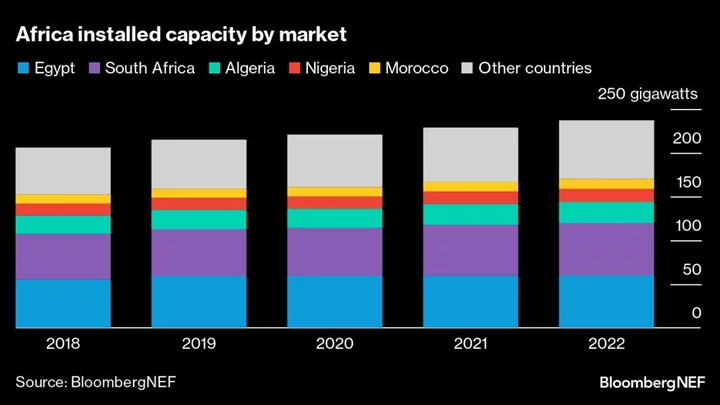
BlackRock Unveils Path to Unleashing $4 Trillion Investment Boom
Researchers working inside a unit of BlackRock Inc. estimate that a reform of public financial institutions could free
2023-11-28 18:13

India Rescuers Break Through Collapsed Tunnel Rubble, PTI Says
Indian rescuers have completed drilling through the rubble in the collapsed tunnel in the Himalayan state of Uttarakhand
2023-11-28 17:00

Atos considers sale of additional assets
IT service provider Atos said on Tuesday it was considering the sale of additional assets to address the
2023-11-28 16:55

UK Development Bank Weighs Investment in Africa Gas Projects
UK development bank British International Investment is still willing to consider funding energy projects in Africa that run
2023-11-28 16:55

Zscaler Had a Good Quarter. Why Analysts Aren’t Worried About Its Stock Fall.
Zscaler stock is suffering despite Wall Street hailing the last quarter as evidence of its strong business. The security-software company’s caution about its guidance looks to have disappointed the market but analysts aren’t too concerned.
2023-11-28 14:39

The Fed Won’t Talk About Rate Cuts. Why Traders Are Betting on Them.
A real-world study gives the edge to Eli Lilly’s weight-loss drug, Amazon faces a potential antitrust hurdle in iRobot deal, and other news to start your day.
2023-11-28 14:27

Nvidia Stock Is Cheap on This Metric. Why It Could Rise More Than 50%.
Nvidia stock has lost some momentum after the company's stellar earnings. The pause in the stock's push higher shouldn't last for long, according to analysts at Melius Research.
2023-11-28 13:17

Rockefeller Foundation Makes Net Zero Pledge for $6 Billion Endowment
The Rockefeller Foundation, established in 1913 by Standard Oil tycoon John D. Rockefeller, announced today that it aims
2023-11-28 13:01

These Stocks Are Moving the Most Today: Zscaler, CrowdStrike, Acelyrin, iRobot, and More
Zscaler shares fall after the cybersecurity company's fiscal-year forecast for calculated billings disappoints. CrowdStrike, Intuit, and Workday are among companies scheduled to report quarterly earnings Tuesday.
2023-11-28 12:38

Investors Keep Buying Dips in These 7 Stocks. Why They’re Trending Up.
While many stocks have struggled in the past couple of years, shares of some of the U.S.’s best businesses keep chugging higher.
2023-11-28 10:30

No ‘smoking gun’ linking mental health harm and the internet – study
The internet and mobile phones may not have a “blanket negative effect” on wellbeing and mental health, researchers say. A large international study used data from two million people aged 15 to 89 in 168 countries, and found smaller associations than would be expected if the internet were causing widespread psychological harm. The researchers say that if the link between internet use and poor health were as universal and robust as many think they would have found it. We looked very hard for a ‘smoking gun’ linking technology and wellbeing and we didn’t find it Professor Andrew Przybylski, Oxford Internet Institute However, the study did not look at social media use, and although the data included some young people, the researchers did not analyse how long people spent online. Professor Andrew Przybylski, of the Oxford Internet Institute, and Assistant Professor Matti Vuorre, Tilburg University, and Research Associate, Oxford Internet Institute, carried out the research into home and mobile broadband use. Prof Przybylski said: “We looked very hard for a ‘smoking gun’ linking technology and wellbeing and we didn’t find it.” He added: “The popular idea that the internet and mobile phones have a blanket negative effect on wellbeing and mental health is not likely to be accurate. “It is indeed possible that there are smaller and more important things going on, but any sweeping claims about the negative impact of the internet globally should be treated with a very high level of scepticism.” Looking at the results by age group and gender did not reveal any specific patterns among internet users, including women and young girls. Instead, the study, which looked at data for the past two decades, found that for the average country, life satisfaction increased more for females over the period. Data from the United Kingdom was included in the study, but the researchers say there was nothing distinctive about the UK compared with other countries. Although the study included a lot of information, the researchers say technology companies need to provide more data, if there is to be conclusive evidence of the impacts of internet use. They explain: “Research on the effects of internet technologies is stalled because the data most urgently needed are collected and held behind closed doors by technology companies and online platforms. “It is crucial to study, in more detail and with more transparency from all stakeholders, data on individual adoption of and engagement with internet-based technologies. “These data exist and are continuously analysed by global technology firms for marketing and product improvement but unfortunately are not accessible for independent research.” For the study, published in the Clinical Psychological Science journal, the researchers looked at data on wellbeing and mental health against a country’s internet users and mobile broadband subscriptions and use, to see if internet adoption predicted psychological wellbeing. In the second study they used data on rates of anxiety, depression and self-harm from 2000-2019 in some 200 countries. Wellbeing was assessed using data from face-to-face and phone surveys by local interviewers, and mental health was assessed using statistical estimates of depressive disorders, anxiety disorders and self-harm in some 200 countries from 2000 to 2019. Read More Young people the biggest users of generative AI, Ofcom study shows Software firm Cloudsmith announces £8.8m investment UK and South Korea issue warning over North Korea-linked cyber attacks Data protection watchdog warns websites over cookie consent alerts Employee data leaked during British Library cyber attack Half of adults who chat online with strangers do not check age – poll
2023-11-28 08:01

Young people the biggest users of generative AI, Ofcom study shows
Teenagers and children are far more likely than adults to have used generative AI, according to Ofcom’s latest research into the UK’s online habits. The regulator said its latest study showed that four in five (79%) online teenagers aged 13-17 now use generative AI tools – which includes chatbots such as ChatGPT, with 40% of those aged 7-12 also using the technology. Generative AI is capable of creating text, images or other media using learned behaviour. In contrast, Ofcom said only 31% of adult internet users had used the technology – and among the 69% who had never used it, 24% did not know what it was. As online safety regulator, we’re already working to build an in-depth understanding of the opportunities and risks of new and emerging technologies, so that innovation can thrive, while the safety of users is protected Yih-Choung Teh, Ofcom OpenAI’s ChatGPT was named the most widely used generative AI tool by those in the study, with 23% of those aged 16 and above saying they used it. When asked why they use the technology, the majority of those aged 16 and over said for fun (58%), a third said they used it for work, and a quarter said they used it to help with their studies. In addition, 22% said they had used it for seeking advice. Yih-Choung Teh, Ofcom’s group director of strategy and research, said: “Getting rapidly up to speed with new technology comes as second nature to Gen Z, and generative AI is no exception. “While children and teens are driving its early adoption, we’re also seeing older internet users exploring its capabilities, both for work and for leisure.” “We also recognise that some people are concerned about what AI means for the future. “As online safety regulator, we’re already working to build an in-depth understanding of the opportunities and risks of new and emerging technologies, so that innovation can thrive, while the safety of users is protected.” Elsewhere in Ofcom’s study, it said it had found that more than a fifth of those aged 8-17 had a social media profile with a false age of 18 or over, putting them at greater risk of encountering potentially harmful content. It also showed that YouTube had replaced Facebook as the most visited platform by UK adults, according to data gathered during Ofcom’s sample month of May 2023. The report also showed that two-thirds of adults reported they had seen or experienced potential online harms in the previous four weeks, with over a third saying this had appeared on their personalised social media feed, where content is tailored to users by a platform’s algorithm. Read More No ‘smoking gun’ linking mental health harm and the internet – study Software firm Cloudsmith announces £8.8m investment UK and South Korea issue warning over North Korea-linked cyber attacks Data protection watchdog warns websites over cookie consent alerts Employee data leaked during British Library cyber attack Half of adults who chat online with strangers do not check age – poll
2023-11-28 08:01
You Might Like...

Australian regulator calls for new competition laws for digital platforms

US States Can Finally Start Applying for IRA Incentive Money

Terrifying 'ice finger of death' killing everything it touches caught on camera

Manchin Scrubs Vote on Energy Agency Nominee Over Gas Stove Rule

Sydney Blanketed in Toxic Smoke for Days Following Planned Burns

8x8 Appoints Samuel Wilson as CEO

Spanish regulator opens first cryptoasset advertising case

Nasa spots shocking number of galaxies like our own in early universe
